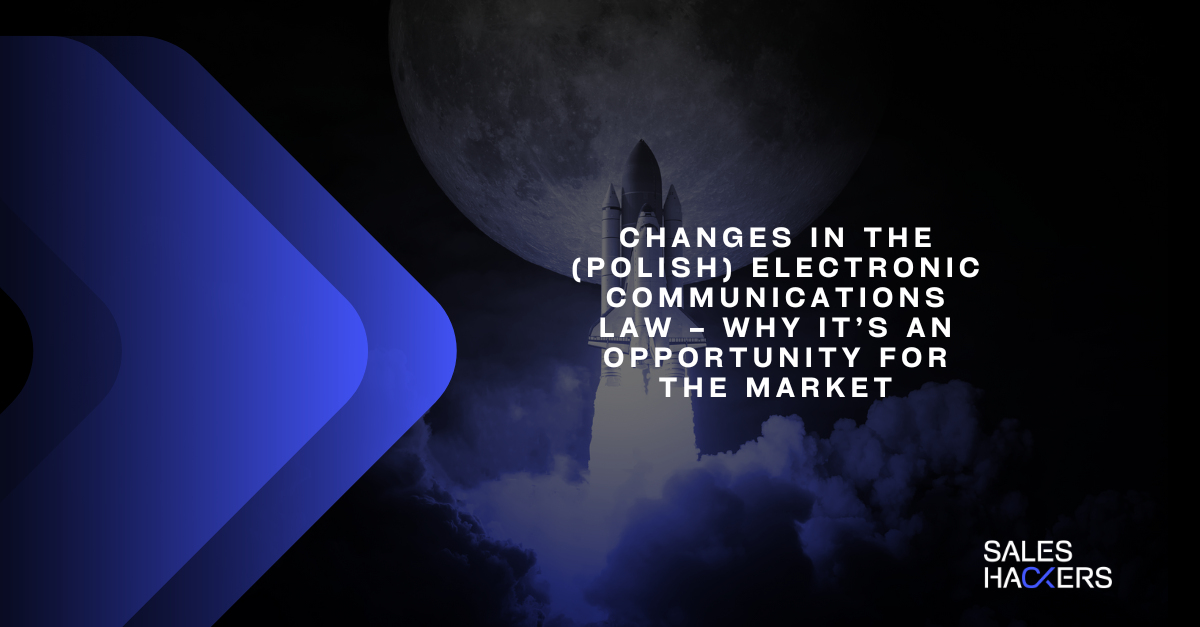Changes in the Electronic Communications Law
05.12.2024

As of November 10, 2024, with the implementation of new regulations under the Electronic Communications Law, many companies, including ours, have faced the challenge of adapting their marketing activities to evolving legislation. While these changes might seem daunting, we see a tremendous opportunity to raise industry standards and strengthen relationships with clients.
Adapting Activities for Polish and International Markets
It’s worth noting that although similar regulations to the Electronic Communications Law—derived from the European Electronic Communications Code—apply in other EU countries, their interpretation and implementation vary depending on local laws. For campaigns targeting countries outside the EU, such as the USA, UAE, or the UK, such regulations may not apply. This means that prospecting activities in these markets are not restricted and can be conducted in line with accepted B2B marketing practices in those regions.
For campaigns on the Polish market, we have implemented a range of measures to ensure full compliance with applicable laws. Our goal is not only to meet legal requirements but also to build trust among clients and the recipients of our messages.
Avoiding the Classification of Communication as Commercial Information
To ensure our actions are fully legal, we strive to ensure that content sent during campaigns is not classified as commercial information under Polish law unless we have explicit consent from the recipient. We employ the following procedures:
-
Educational Content: We focus on providing neutral and valuable content that helps recipients solve their problems instead of directly promoting services or products.
Example message: "I noticed that many companies in the TSL industry struggle with rising costs and data analysis challenges. We’ve prepared material discussing the latest trends in optimizing transport processes. May I share this report with you?" -
Minimizing Promotional Elements: Our initial messages are informational and devoid of aggressive sales elements.
-
Avoiding Sales Links: We refrain from including links leading directly to sales pages in the early stages of contact.
Exceptions to the Need for Consent
While the general rule under the Electronic Communications Law is the requirement for consent, there are scenarios where communication with potential B2B clients can occur without it. These are based on the lawful basis of legitimate interest under GDPR. In such cases, communication must meet specific conditions:
-
Business Relationship Initiation: Contacting a potential client, such as someone responsible for procurement or business development, to propose a collaboration that could benefit both parties may qualify as a legitimate interest. For instance, presenting proposals related to products or services relevant to the recipient’s industry.
-
Existing Business Relationships: Under Article 6(1)(f) of GDPR, marketing communication regarding products or services similar to those already purchased in a prior transaction is permissible. However, recipients must always have the option to opt out of further contact.
-
Invitations to Industry Events: Invitations to educational or industry events, such as webinars or conferences, can be sent without consent if they address relevant topics and are offered free of charge.
-
Communication to Generic Business Email Addresses: Emails sent to generic addresses, such as "info@saleshackers.pl" or "biuro@saleshackers.pl," which are not tied to specific individuals, do not require consent.
A New Standard for Obtaining Consent
To meet legal requirements while streamlining our processes, we have introduced systems that facilitate obtaining consent for contact.
-
Platforms for Consent Management: We use tools like Calendly, which allow recipients to independently provide consent for further contact, making the process transparent and ensuring recipients have full control over their communication preferences.
-
Lead Magnets: We create valuable educational materials, such as e-books, reports, and webinar invitations, that encourage recipients to provide consent for contact. Participation in such events or newsletter subscriptions establishes a trust-based relationship, enabling us to deliver tailored content to recipients.
New Law – An Opportunity, Not a Threat
Although the changes require greater precision in marketing activities, we see potential for improving the quality of the entire market.
-
Market Cleansing: Eliminating spam and unlawful practices will enhance the credibility of companies that comply with the regulations. Recipients will be more inclined to engage with companies that operate transparently and offer valuable content.
-
Raising Standards: The new regulations compel companies to focus more on precision and quality in communication. This includes the way campaigns are conducted and the quality of content produced—articles, newsletters, lead magnets, or reports. Companies that invest in valuable and well-prepared content will gain a competitive edge.
-
Content’s Growing Importance: In this new reality, content becomes a key tool for acquiring and retaining clients. Content marketing, encompassing educational articles, reports, and lead magnet materials, will play an even more significant role in building trust and client relationships.
-
Development of ABM (Account-Based Marketing): Regulatory changes make ABM increasingly important as a strategy tailored to specific clients' needs. Personalization and precise targeting become indispensable elements of effective outbound lead generation campaigns.
Conclusion
The new regulations present challenges but also create opportunities to operate more effectively and transparently. By aligning our procedures, ensuring compliance, and focusing on quality and valuable communication, we are prepared to continue delivering high-quality lead generation services in the new legal landscape.

